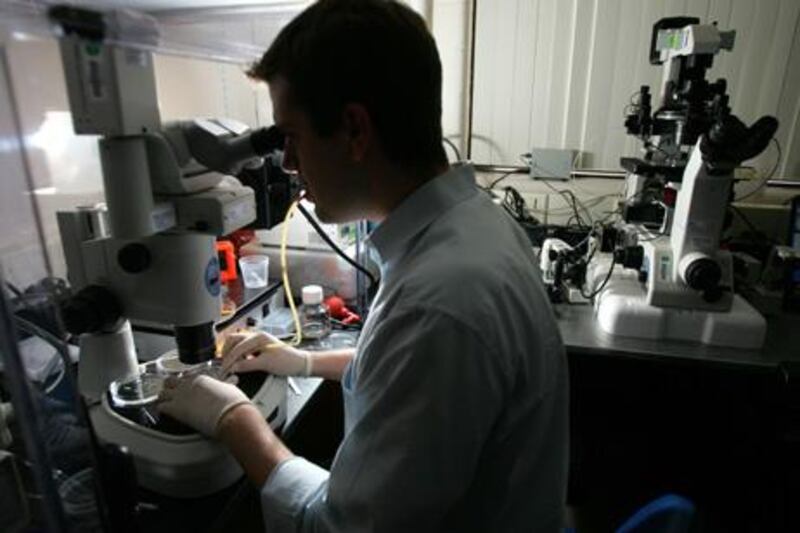Could we really be a significant step closer to curing one of the world's most common and complex of diseases? Reports late last year of two new studies by scientists based in the UK suggest that may be the case. But for a condition as complicated as multiple sclerosis (MS), the experts prefer to err on the side of caution before announcing that a "cure" is imminent.
MS affects approximately 2.5 million people worldwide. In Arab populations it's estimated that 25 to 50 people per 100,000 have the disease. Now new research from Cambridge and Edinburgh universities may give new hope to sufferers.
Multiple sclerosis is a disease of the nervous system. It occurs when myelin, the protective sheath that surrounds nerve fibres, gets damaged. This then derails the connection between the brain's messaging system and other parts of the body. Everyday activities that so many of us take for granted, from walking and talking to eating and even feeling pain and other sensations, become challenging as the instructions and feedback that pass around the body get lost in communication.
Sufferers can experience a multitude of symptoms as MS tightens its grip, including blurred vision, slurred speech, numbness in the face or limbs, loss of co-ordination, paralysis and memory problems. "But what makes it even tougher to diagnose and deal with is that few of the symptoms of MS are unique to the disease," explains Laura Amiss, specialist adviser with the Multiple Sclerosis Resource Centre in the UK. In the past symptoms have been mistaken for anxiety and even flu in the early stages.
"Also, the severity and incidence of symptoms vary enormously from one person to the next," she says. In its most common form, relapsing-remitting MS, symptoms can lie dormant for years before flaring up. In Britain it is estimated that between 80 and 90 per cent of MS patients have a relapsing-remitting form of the condition.
But around 10 per cent of people are diagnosed with a "progressive" form, where the decline continues without any period of remission. In addition, more than half of MS sufferers enter a stage of slow deterioration (called secondary progressive) where the disease no longer responds well to drugs designed to combat it.
The latest findings from the joint research at Cambridge and Edinburgh, co-funded by the MS Society, identified a molecule that appears to stimulate the brain's natural ability to repair myelin in rodents. "Therapies that repair damage are the missing link in treating MS," explains Prof Robin Franklin, director of the MS Society's Centre for Myelin Repair at the University of Cambridge.
"In this study we have identified a means by which the brain's own stem cells can be encouraged to undertake this repair, opening up the possibility of a new regenerative medicine for this devastating disease."
These "good news" stories about MS are being followed avidly by patients in the UAE. Recently, public awareness of the condition has been raised through several events, including an evening of poetry, film and dance at the American University of Sharjah in December. More than 400 people attended the performance by members and friends of the UAE MS Support Group.
Last November also saw the formation of the Middle East Multiple Sclerosis Platform in the UAE, which brought together several independent MS organisations and care groups in a bid to organise support activities for MS research throughout the Middle East. "We are committed to building a movement by and for people with MS that will move us closer to a world free of multiple sclerosis," said Dr Tawfik Alsadi, head of neurology at Sheikh Khalifa Medical City, Abu Dhabi, at the launch.
However, when it comes to the new research, Dr Mike Boggild, consultant neurologist at the Walton Centre in Liverpool, England, is cautious: "We're still looking at maybe five to 10 years before we know how good this is. It's possible drugs could be on their way that will help repair damage caused to the myelin lining nerve cells in the brain and so halt the deterioration for secondary progressive MS sufferers. But stem-cell-based research has been at the bottom of the garden path, as it were, for a number of years. Things are getting nearer, but we're not there yet and we've had false dawns in the past."
Boggild does agree that the future for MS patients "has never been so promising as it is now". Any patient diagnosed with active relapsing-remitting MS should discuss the possibility of "so-called disease modifying treatment" with a neurologist or MS nurse, he emphasises.
Crucially, this research follows the launch, last year, of a treatment called Gilenya (also known as fingolimod), the first pill to help manage the symptoms of relapsing-remitting MS. "It was first approved in Russia and has since been approved in the US for relapsing-remitting MS patients. It has also been submitted to the European Medicines Agency and is being reviewed," says Amiss. In the UAE, the drug is being assessed for licensing by the Ministry of Health.
Until now interferon beta-1a, the drug used to treat most MS sufferers, has had to be injected one to three times a week, so the advent of a tablet that can be taken by mouth "will have an enormously positive impact on the lives of many MS sufferers", says Amiss.
Multiple Sclerosis International Federation
Multiple Sclerosis Society
Follow us on twitter and keep up to date with the latest in arts and lifestyle news at twitter.com/LifeNationalUAE






